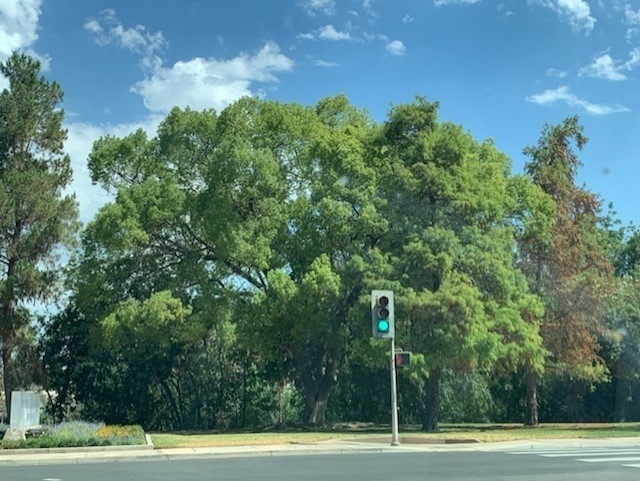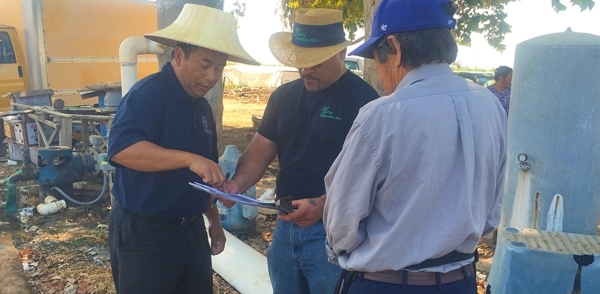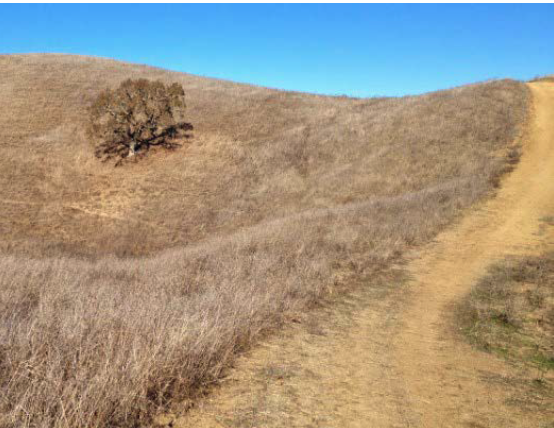Posts Tagged: sheep shearing
Lawn-pocalypse! Surviving Drought
Ah, summer! The season of sunburns, pool parties, and… lawn droughts. If your once lush, green carpet now looks like a crunchy brown doormat, you're not alone. Let's dive into why your yard is staging a dramatic death scene and what you can do to...

Bermuda grass and weeds overtaking drought stressed turf grass.
Shearing students, ranchers flock to livestock advisor Harper
UCCE livestock advisor John Harper retires after 32 years
"If you know how to shear, you'll never be poor," Stephany Wilkes remembers John Harper, University of California Cooperative Extension livestock and natural resources advisor for Mendocino and Lake counties, telling her sheep shearing class in 2013.
“He was speaking to everyone, of course, but he really spoke to me: being poor (again) is one of my greatest fears and I've avoided it at all costs,” Wilkes said. Harper's words and a certificate from the course gave her the confidence to leave Silicon Valley for greener pastures.
“Eleven years later, with a successful business and published book about shearing to boot, I can confirm John does not lie to his students,” says the former software developer. “More than that, he is encouraging, calm, respectful, experienced, honest, funny and an excellent storyteller. If not for John, I would not have the life I live today.”
Today, Wilkes is a sheep shearer, knitter and author of “Raw Material: Working Wool In the West.”
Harper officially retired July 1, 2023, after 32 years in his UC Cooperative Extension advisor role, but returned to serve as interim director of UCCE for Mendocino and Lake counties until Matthew Barnes was hired on May 1.
For years, UCCE has offered the only five-day sheep shearing school in California, training 15 to 28 students annually, and Harper has been the force behind it.
“Most of the shearers now in the shearing business in California were trained by me and my fellow instructors,” said Harper, the state's Ed Sheeran of sheep shearing.
He first offered the sheep shearing school in 1993 at the Paul and Kathy Lewis ranch in Upper Lake, with subsequent schools at the Stanley Johnson ranch in Booneville. In the early days, Harper brought in instructors from New Zealand, before he and Mike McWilliams, a former member of the USA Sheep Shearing Team, began teaching. Later Harper moved the school to UC Hopland Research and Extension Center, where he has hosted the school for the past 27 years.
With grant funds from the National Sheep Industry Improvement Association, Harper bought shearing equipment and made seven portable shearing pens to offer shearing school at a private ranch in Clear Lake Oaks this year.
“This program is nationally and internationally known and there is a waiting list of over 1,000 people who want to take it,” Harper said.
Harper's baa-ackground in 4-H
Growing up on his family's farm in Yucaipa, just east of San Bernardino, Harper's electrical engineer father gave him a choice between caring for the horses' hooves and shearing sheep. “I chose shearing since I wasn't very big and didn't like horses leaning on me,” he said.
From age 9 to 19, he was active in the California 4-H Youth Development Program, achieving the Gold Star rank. “I was in 4-H with sheep, horses, veterinary medicine, tractor, electrical, welding and woodworking projects,” said Harper, who won the outstanding junior leader award. “I was a junior leader in sheep and won the state award for my sheep project. I showed registered Hampshire sheep, and my flock grew to 50 ewes before I was done.”
“Shearing sheep helped me pay for college,” said Harper, who earned a master's degree in range management at the University of Arizona and a bachelor's degree in animal science and agricultural economics at UC Davis.
After college, Harper worked as an assistant manager on the PolyPay breed development at Nicolas Sheep Farms in Sonoma before starting a career in Cooperative Extension in Arizona.
When Harper joined UC Agriculture and Natural Resources in 1991, the internet was in its infancy, but he recognized its potential for sharing information. He learned how to write code and created the university's first websites for livestock and natural resources. He also was an early adopter of blogging, Facebook, LinkedIn and Twitter to extend information, which earned him a silver award in 2011 from the Association of Natural Resources Extension Professionals.
Beyond shearing, Harper pioneered cutting-edge research
Although sheep are more photogenic on social media, Harper has been flooded with awards and accolades for his water quality research.
Informed by research from Harper, Lake County rancher Russ Rustici created the first rangeland water-quality ranch plan in the state. Rustici was so pleased that he donated research funding for the entire UC Rangeland Watershed Program team and later established two endowed chairs at UC Davis and one at UC Berkeley. The Rustici Endowment now provides research and education grants for rangeland and cattle efforts.
In 1995, Harper and his UCCE colleagues began teaching the Rangeland Water Quality Planning Short Course to help land managers develop water-quality management plans for their ranches to prevent water pollution. By 2015, they had taught more than 80 of these short courses, reaching more than 1,000 ranchers in 35 counties, representing over 2 million acres statewide. In one follow-up survey, 68% of the participants said they had implemented practices on their ranches to protect or improve water quality.
In 2012, the Western Extension Directors Association presented Harper with its Award of Excellence for the Rangeland Watershed Program.
Eating between the vines
For one livestock research project, he and UCCE colleagues trained sheep to graze the grass in vineyards and not eat the grapevines. “The results went viral internationally and really brought targeted grazing to the forefront,” Harper said. “It also raised sheep number by 2% in our two counties.”
In addition to advising ranchers and teaching sheep shearing, Harper has served in several leadership positions, rotating in every few years as UCCE director in Mendocino and Lake counties. From 2014 to 2017, he led UC ANR's Sustainable Natural Ecosystems Strategic Initiative, advocating for the hiring of experts in climate change, economics, small ruminants, forestry and fire.
“I'm especially proud that we were able to recruit a small ruminant extension veterinary specialist – a position that was unfilled for over seven years, despite California being the second-largest sheep-producing state in the nation,” Harper said.
The certified rangeland manager and rangeland professional has long been a member of the Society for Range Management and the American Society for Animal Science. In 2008, he served as president of the California-Pacific Section of the Society for Range Management. Currently he is the secretary/treasurer for the Mendocino/Lake Wool Growers Association and is ad hoc director of the Mendocino/Lake County Cattlemen's Association.
In 2015, the Society for Range Management gave him the Outstanding Achievement Award-Stewardship. In 2017, the California Wool Growers Association bestowed on him its Golden Fleece Award for Lifetime Achievement. In 2019, Harper was named Range Manager of the Year by the California-Pacific Section of the Society for Range Management for his contributions to the profession. In 2022, the 12th District Agricultural Association Redwood Empire Fair honored him with their Mendocino County Agriculturalist of the Year Award.
Harper also received UC Agriculture and Natural Resources' prestigious emeritus status. In retirement, he plans to play his banjo and continue offering the sheep shearing school with GaryVorderbuggen, who has been teaching with him for 18 years. Randy Helms, a former member of the USA Sheep Shearing Team, and Harper's former students Matt Gilbert, Lora Kinkade and Wilkes are among those who have re-ewe-nited with him as sheep shearing instructors.
“John taught the UCCE sheep shearing schools I attended in 2013-2015, and I was deeply honored to teach beside him in 2023 and 2024. It is one of the highlights of my life,” said Wilkes, now better known for working with wool than developing software.
“Like so many past students, I am forever in his debt,” she added. “We've got to keep this shearing school you started going, John. It is a gift. Thank you.”
Opportunity to Support the US Sheep Shearing Team at the Golden Shears World Championships
Support the American Shearing Team
Producers looking to support the American team headed to the Golden Shears World Championships next month in Scotland can do so by purchasing a Team USA T-shirt or hoodie offered through American Hero Clothing.
The T-shirt sells for $30 and the hoodie for $60. A portion of the proceeds will support travel expenses for the American team.
Click Here to buy the T-shirt.
Click Hereto buy the Hoodie.
Source: American Sheep Shearers Council
Climate-Change Resources
University of California UC ANR Green Blog (Climate Change and Other Topics) https://ucanr.edu/blogs/Green/index.cfm?tagname=climate%20change (full index)
Examples:
- Save Trees First: Tips to Keep Them Alive Under Drought https://ucanr.edu/b/~CdD
- Landscaping with Fire Exposure in Mind: https://ucanr.edu/b/~G4D
- Cities in California Inland Areas Must Make Street Tree Changes to adapt to Future Climate https://ucanr.edu/b/~oF7
Drought, Climate Change and California Water Management Ted Grantham, UC Cooperative Extension specialist (23 minutes) https://youtu.be/dlimj75Wn9Q
Climate Variability and Change: Trends and Impacts on CA Agriculture Tapan Pathak, UC Cooperative Extension specialist (24 minutes) https://youtu.be/bIHI0yqqQJc
California Institute for Water Resources (links to blogs, talks, podcasts, water experts, etc.) https://ciwr.ucanr.edu/California_Drought_Expertise/
UC ANR Wildfire Resources (publications, videos, etc.) https://ucanr.edu/News/For_the_media/Press_kits/Wildfire/ (main website)
-UC ANR Fire Resources and Information https://ucanr.edu/sites/fire/ (main website)
-Preparing Home Landscaping https://ucanr.edu/sites/fire/Prepare/Landscaping/
UC ANR Free Publications https://anrcatalog.ucanr.edu/ (main website)
- Benefits of Plants to Humans and Urban Ecosystems: https://anrcatalog.ucanr.edu/pdf/8726.pdf
-Keeping Plants Alive Under Drought and Water Restrictions (English version) https://anrcatalog.ucanr.edu/pdf/8553.pdf
(Spanish version) https://anrcatalog.ucanr.edu/pdf/8628.pdf
- Use of Graywater in Urban Landscapes https://anrcatalog.ucanr.edu/pdf/8536.pdf
- Sustainable Landscaping in California https://anrcatalog.ucanr.edu/pdf/8504.pdf
Other (Non-UC) Climate Change Resources
Urban Forests and Climate Change. Urban forests play an important role in climate change mitigation and adaptation. Active stewardship of a community's forestry assets can strengthen local resilience to climate change while creating more sustainable and desirable places to live. https://www.fs.usda.gov/ccrc/topics/urban-forests
Examining the Viability of Planting Trees to Mitigate Climate Change (plausible at the forest level) https://climate.nasa.gov/news/2927/examining-the-viability-of-planting-trees-to-help-mitigate-climate-change/
Reports and other information resources coordinated under the auspices of the United Nations and produced through the collaboration of thousands of international scientists to provide a clear and up to date view of the current state of scientific knowledge relevant to climate change. United Nations Climate Action
Scientific reports, programs, action movements and events related to climate change. National Center for Atmospheric Research (National Science Foundation)
Find useful reports, program information and other documents resulting from federally funded research and development into the behavior of the atmosphere and related physical, biological and social systems. Search and find climate data from prehistory through to an hour ago in the world's largest climate data archive. (Formerly the "Climatic Data Center") National Centers for Environmental Information (NOAA)
Think tank providing information, analysis, policy and solution development for addressing climate change and energy issues (formerly known as the: "Pew Center on Global Climate Change"). Center for Climate & Energy Solutions (C2ES)
Mapping Resilience: A Blueprint for Thriving in the Face of Climate Disaster. The Climate Adaptation Knowledge Exchange (CAKE) was launched in July 2010 and is managed by EcoAdapt, a non-profit with a singular mission: to create a robust future in the face of climate change by bringing together diverse players to reshape planning and management in response to rapid climate change. https://www.cakex.org/documents/mapping-resilience-blueprint-thriving-face-climate-disaster
Cal-Adapt provides a way to explore peer-reviewed data that portrays how climate change might affect California at the state and local level. We make this data available through downloads, visualizations, and the Cal-Adapt API for your research, outreach, and adaptation planning needs. Cal-Adapt is a collaboration between state agency funding programs, university and private sector researchers https://cal-adapt.org/
Find reports, maps, data and other resources produced through a confederation of the research arms of 13 Federal departments and agencies that carry out research and develop and maintain capabilities that support the Nation's response to global change. Global Change (U.S. Global Change Research Program)
The Pacific Institute is a global water think tank that combines science-based thought leadership with active outreach to influence local, national, and international efforts to develop sustainable water policies. https://pacinst.org/our-approach/
Making equity real in climate adaptation and community resilience policies and programs: a guidebook. https://greenlining.org/publications/2019/making-equity-real-in-climate-adaption-and-community-resilience-policies-and-programs-a-guidebook/
Quarterly CA Climate Updates and CA Drought Monitor Maps (updated each Thursday) https://www.drought.gov/documents/quarterly-climate-impacts-and-outlook-western-region-june-2022
Drought focus of Water Resources IMPACT magazine special issue
UC ANR experts address emotional toll of drought
Preparing the American West for prolonged drought is the focus of a double issue of Water Resources IMPACT magazine. The California Water Commission staff are guest editors for this special open-access edition of the magazine, which is published by the American Water Resources Association.
Faith Kearns, academic coordinator of University of California Agriculture and Natural Resources' California Institute for Water Resources, is among the authors delving into how drought impacts people and the environment and how we can better prepare for the inevitable.
The first issue, published on Feb. 14, focuses on water scarcity issues confronting California and the ways these issues affect different sectors.
In “Trauma, Care, and Solidarity: Addressing the Emotional Toll of Chronic Drought,” Kearns highlights the effects of drought on mental health. She points to the spike in suicide hotline calls when wells ran dry in Southeast Asian communities in California's Central Valley.
By listening to Southeast Asian farmers, Ruth Dahlquist-Willard and Michael Yang of UC Cooperative Extension were able to “lighten the load” for them by providing pragmatic support, Kearns writes.
“The scale of some of these highly emotional issues – drought, wildfires, climate change – can make them seem incredibly difficult, if not impossible, to deal with,” Kearns said. “At the same time, they are affecting everyone living in the western U.S. on a daily basis. I wanted to highlight and provide models based on work that people – whether they are researchers, clinical psychologists, or Cooperative Extension advisors – are doing right now to ease the way.”
The authors who contributed to the double issue are a diverse array of Tribal experts, academics, nongovernmental organization thought-leaders, water managers and water policy influencers, each of whom brings their own perspective on the topic of drought. Their expertise and perspectives in climate science, water policy and water management will help inform drought-related decision-making and support policies that better prepare the state to thrive during periods of prolonged water scarcity.
In addition to Kearns, the first issue includes articles contributed by:
- Samantha Stevenson, University of California, Santa Barbara
- Jay Lund, University of California, Davis
- Ron Goode, North Fork Mono Tribe
- Andy Fecko, Placer County Water Agency
- Jeff Mount, Public Policy Institute of California, and Ted Grantham, University of California, Berkeley/UC Cooperative Extension
- Nat Seavy and Karyn Stockdale, National Audubon Society
- Kjia Rivers, Community Water Center
- Cannon Michael, Bowles Farming
- Michelle Reimers, Turlock Irrigation District
The January/February edition of Water Resources IMPACT magazine can be accessed, free of charge, on the American Water Resources Association website at https://www.awra.org under “Publications.”
The second issue, to be published in March, will focus on drought response, considering the options for adaptation. This two-part series complements the Commission's work on strategies to protect communities and fish and wildlife in the event of a long-term drought.








